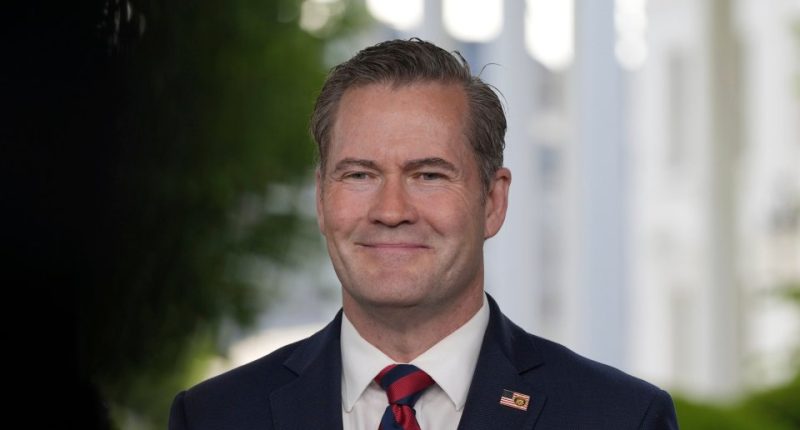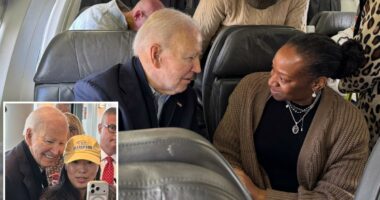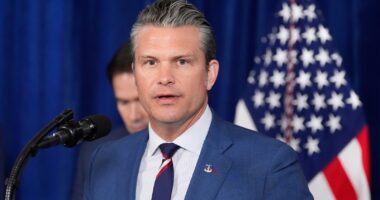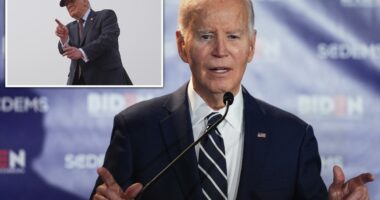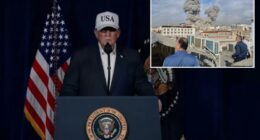Share this @internewscast.com
MICHAEL Waltz is out as National Security Advisor and President Donald Trump has named a temporary replacement.
Waltz is set to take on a new role, with Secretary of State Marco Rubio temporarily handling additional responsibilities until President Trump appoints a new permanent head of national security.
“I am happy to share that Mike Waltz will be my nominee for the position of United States Ambassador to the United Nations,” Trump announced on TruthSocial on Thursday afternoon.
“During the meantime, Secretary of State Marco Rubio will step in as National Security Advisor while maintaining his effective leadership at the State Department.”
The statement by the president came hours after it emerged that Waltz would be exiting the role but his future in the administration was still unclear.
During a National Day of Prayer Event at the White House’s Rose Garden, Trump praised several of his cabinet members and the work they’ve been doing, but made no mention of Waltz during his remarks.
By Thursday afternoon, Waltz acknowledged the position change on X, sharing a screenshot of Trump’s announcement and captioning the post, “I’m deeply honored to continue my service to President Trump and our great nation.”
Waltz’s exit from his current role is the first major staff shake-up of Trump’s administration since he took office in January.
Waltz also attended a cabinet meeting in the White House on Wednesday, where he praised Trump’s leadership and strength as other officials weighed in on the president’s first 100 days in office.
“We’ve had 100 days of your leadership, with respect, with strength,” Waltz said.
“It’s an honor to serve you in this administration, and I think the world is far better and far safer for it.”
SIGNAL SCANDAL
The bombshell ousting comes weeks after Waltz took the blame for the Signal group chat scandal, where top Trump administration officials accidentally shared information about imminent military strikes on Houthi targets in Yemen with a journalist.
The group chat included more than a dozen defense and intelligence officials from the Trump administration, including Vice President JD Vance and Defense Secretary Pete Hegseth, among others.
Members of the group did not realize at the time that The Atlantic’s editor-in-chief, Jeffrey Goldberg, was mistakenly added to the chat.
“I take full responsibility. I built the – I built the group,” Waltz told Fox News at the time.
Trump’s full statement on Waltz’s exit
“I am pleased to announce that I will be nominating Mike Waltz to be the next United States Ambassador to the United Nations. From his time in uniform on the battlefield, in Congress and, as my National Security Advisor, Mike Waltz has worked hard to put our nation’s interests first.
“I know he will do the same in his new role. In the interim, Secretary of State Marco Rubio will serve as National Security Advisor, while continuing his strong leadership at the State Department.
“Together, we will continue to fight tirelessly to Make America, and the World, SAFE AGAIN. Thank you for your attention to this matter!”
“My job is to make sure everything’s coordinated.”
Goldberg said the leak began on March 11, when he spoke with Waltz on Signal and was later added to a chat named “Houthi PC small group.”
The editor believes his number was mistaken for that of Jamieson Greer, a former US trade representative, due to their shared initials “JG.”
Over the course of several days, Goldberg revealed he received messages from senior administration officials in the minutes leading up to the March 15 military strike and after.
SENSITIVE MILITARY OPERATION PLANS
Goldberg published several excerpts from the messaging chain in his article, “The Trump Administration Accidentally Texted Me Its War Plans.”
In one exchange, Waltz referenced “tasking per the President’s guidance” in classified inboxes.
Vance raised concerns, responding, “There is a real risk that the public doesn’t understand this or why it’s necessary.”
Hegseth then replied, “I understand your concerns,” before pushing ahead with the argument to conduct the airstrike.
After the attacks, cabinet members praised the airstrike as “excellent” and a “good start,” as Secretary of State Marco Rubio congratulated Hegseth, “Good job Pete and your team.”
Waltz responded on the chat with the fist emoji, followed by the American flag, and the fire emoji.
WHITE HOUSE TURMOIL
At the time of the scandal, Trump stood by Waltz, saying his national security adviser had “learned his lesson” before calling him a “good guy.”
Trump even brushed off the leak, saying it had “no effect” on the military operation.
However, behind closed doors, Trump’s advisers had already constructed their views on Waltz and his blunder.
Trump had expressed frustration with Waltz on several occasions, including about the Signal scandal, according to CNN.
“President Trump lost confidence in him a while ago,” a source told the outlet.
Who can replace Mike Waltz as national security adviser?
Mike Waltz is reportedly expected to exit from his role as national security adviser in the Trump administration.
A new replacement has not been named; however, here’s a list of names that are reportedly being considered:
- Stephen Miller: Trump’s policy chief
- Sebastian Gorka: national security council senior director of counterterrorism
- Richard Grenell: Trump’s special envoy for special missions
- Steve Witkoff: Trump’s special envoy
Names reportedly being considered as temporary replacements:
- Christopher Landau: deputy secretary of state
- Marco Rubio: secretary of state
A replacement has reportedly been discussed for weeks; however, it remains unclear who will take the mantle as national security adviser.
Steve Witkoff, Trump’s special envoy, is the lead pick to replace Waltz, according to Politico.
But Witkoff has told people close to him that he does not want the post, CNN reported.
Other names being thrown around include Trump’s policy chief Stephen Miller; National Security council senior director for counterterrorism Sebastian Gorka; and special envoy for special missions Richard Grenell, the outlet reported.
How Trump changed the world in first 100 days

Donald Trump has signed over 140 executive orders in his first 100 days back in office. After making a slew of promises before re-entering the White House, what has he achieved so far?
Education:
Trump signed an executive order to cut federal money to schools that support or are seen to “push critical race theory, transgender insanity, and other inappropriate racial, sexual or political content” onto children.
He has also signed an order to cut funding to schools that have a mandate about vaccines and masks.
The President is also working on closing the federal Education Department and pulling back on DEI policies and programs, directing the federal government to end its diversity and equity programs.
Classified Records:
In March 2025, the White House released the classified documents on the assassination of JFK, something Trump vowed to do in October 2024 “immediately” after re-entering office.
Energy:
In September 2024, Trump vowed to declare a national energy emergency to push for more drilling and boosting “domestic energy supply” which he did when he signed an executive order upon entering the White House.
Another promise he has kept was signing an executive order to remove the US from the Paris Agreement.
Two other orders Trump has signed are working to keep his promises to end state emissions waivers that limit sales of gas-powered cars and to bring an end to the “electric vehicle mandate.”
Foreign Affairs:
The President vowed to end the Russia-Ukraine war soon after entering office and has become a key negotiator between the warring nations.
Though he has so far failed to end the bloodshed, his action has moved talks on to finding a ceasefire agreement.
He also criticised the amount of US funding going to Ukraine, quickly ramping up pressure on European allies to take on more of the burden.
As part of his diplomacy and foreign strategy, Trump has already hosted at least 11 world leaders in his first 100 days with Israeli Prime Minister Benjamin Netanyahu being the first leader welcomed to the White House on February 4.
Government:
Trump said he would fire government employees who he says are “corrupt bureaucrats” which is something he has addressed via another executive order.
He also established DOGE to root out blockers to efficiency with Elon Musk brandishing the “chainsaw for bureaucracy.”
DOGE cuts have seen major reductions in the US Agency for International Development (USAID) and attempts to make cuts in the Department of Education.
Cuts of $47.4 billion have been made to the Department of Health and Human Services while over $45 billion has been taken from the Agency for International Development, and $2.6 billion has been cut from the Department of State, according to DOGE.
Immigration:
The President has long been waging a war on immigration and has signed numerous executive orders in a bid to fulfil his plans.
These include carrying out the biggest deportation in US history to “end the migrant invasion,” ending the constitutional right to birthright citizenship, banning refugees from Gaza and removing the student visas of those deemed to be pro-Hamas protesters, “radical anti-American and anti-Semitic foreigners.”
He also signed an order to start “ideological screening” for all immigrants and axed the CBP One app used by migrants to schedule appointments US border patrol agents.
Illegal border crossings from Mexico are now the lowest they have been for over four years but there are fears that some of those being deported under Trump’s action against “killers and thugs” are innocent and are not being given due process.
Pardons:
Trump has pardoned over 1,500 people including the majority of those convicted or charged in the Capitol Hill riots on January 6, 2021.
He has also pardoned Ross Ulbricht, the founder of a dark web marketplace known as Silk Road and Charles Kushner, Ivanka Trump’s father-in-law who was in prison for tax evasion, witness tampering, and campaign finance offences.
Tariffs:
In November, Trump said he would “tariff the hell out of countries that have been taking advantage” of the US, something he is continuing to work on after his “Liberation Day” announcement of a “reciprocal tariff” strategy with tariffs up to 145%, most harshly impacting China.
Taxes:
Through congressional action, the President has started cutting corporate tax rates to 15%, make tax cuts permanent, have no tax on tips, scrap taxes on Social Security and overtime pay, and making interest on car loans entirely tax deductible.
